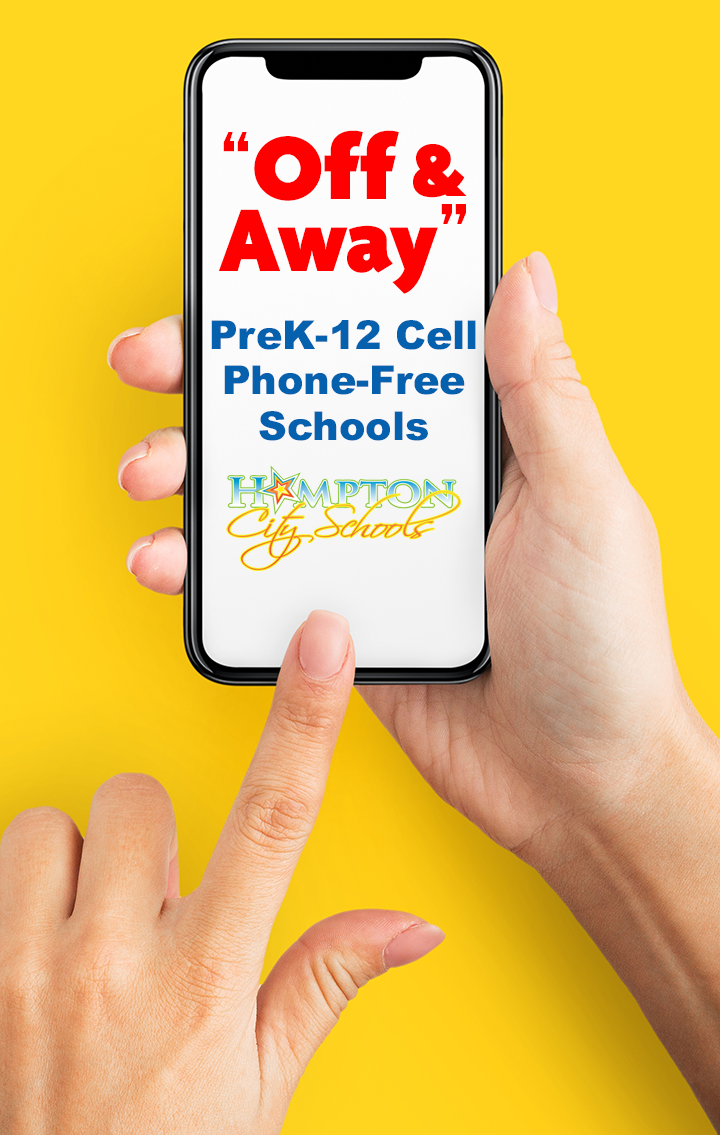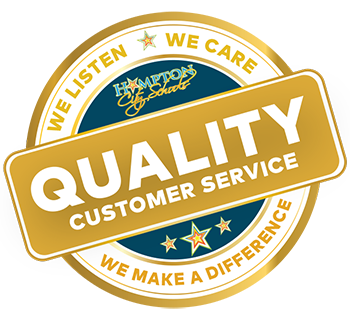CELL PHONE-FREE EDUCATION
On July 9, 2024, Virginia Governor Glenn Youngkin signed an Executive Order mandating cell phone restrictions in public schools during instructional hours. This action is based on growing evidence that cell phone and social media use can negatively impact students' academic success and mental well-being. As a response, and in alignment with state guidance, Hampton City Schools (HCS) adopted a comprehensive "cell phone-free education" policy, effective January 6, 2025. Following Virginia House and Senate approval, the order became law, effective July 1, 2025. Currently HCS Policy JP meets the requirements of the new law and will continue to guide expectations on cell phone and electronic device use in schools PreK-12.
The Frequently Asked Questions (FAQs) below provide a detailed overview of the new law, its purpose, and how it will be implemented across our schools. We aim to create an environment where students are fully engaged in their learning and build meaningful connections with peers. This policy supports HCS's mission to foster safe, distraction-free, and nurturing school environments for all students.
Will HCS be changing the division’s cell phone/device use policy because of the new legislation?
On July 9, 2024, Virginia Governor Glenn Youngkin issued Executive Order 33 to bring cell phone-free education to Virginia schools. This directive came from the understanding that cell phones have contributed to student disengagement and negative mental health effects on children. In May 2025, HB1961 and SB738 were signed into law. This bipartisan legislation codified( Va Code § 22.1-79.3:1.) the Bell-to-Bell Cell Phone-Free policy introduced in Executive Order 33. Under the new law, all Virginia school divisions are now required to implement a policy restricting student cell phone use during instructional hours to support focused, distraction-free learning environments. Hampton City Schools’ current electronic device PolicyJP meets the requirements of the new law and guides the expectations for students regarding cell phone and other electronic device use in schools. No significant changes are expected.
What is a “cell phone-free education”?
HCS is required to adopt the VDOE model that defines "cell phone-free education" as the age-appropriate elimination or restriction of cell phones and other electronic devices (including smartwatches, tablets, and similar devices capable of sending and receiving messages) across all schools. HCS believes that limiting cell phone use during the school day will not only reduce distractions and enhance learning opportunities but will also encourage students to build stronger, more supportive relationships with one another. Increased student engagement and positive connections foster a sense of belonging for all students, directly supporting our goal of creating safe, nurturing environments in every school.
How will the new law affect phone-free rules for students in HCS schools?
Virginia law now mandates that cell phones and electronic devices must remain off and stored away throughout the instructional day (from bell to bell). However, current policy and practices in our schools are not expected to change. This instructional period begins when students enter their first class or study block and concludes when they leave their final class of the day. “Stored” is specifically defined in the state guidance as keeping the cell phone or personal electronic device off the student’s person, meaning it should not be in pockets or worn on the body.
The guidance provided by the Virginia Department of Education gives schools several storage options, such as keeping devices in a backpack, bag, locker, or other designated areas within the school or classroom. Personal devices must remain stored away during all instructional times, including restroom breaks, lunch, and hallway transitions between classes. Use of these devices is strictly prohibited during these periods.
The current HCS policy had already prohibited students from carrying devices, such as cell phones and headphones, on their person. Under the new law, this practice will be continued. Students will be expected to use only HCS-issued technology for all instructional activities.
Divisions continue to be able to establish their own procedures for off-site events and activities, including school transportation. While some divisions may not allow cell phones and devices on buses, HCS supports responsible use of such devices. As such, the use of cell phones and other personal devices will still be permitted on school buses and at events or activities occurring after the instructional day.
What type of devices are included in the Policy JP?
Devices that connect via Wi-Fi or cellular data, including (but not limited to) the following, are restricted under this policy:
- Cell phones
- Tablets and e-readers
- Personal (non-HCS) laptops and Chromebooks
- Handheld gaming systems/consoles
- Smartwatches
- Bluetooth devices, including personal (non-HCS) headphones
- Smart glasses
This policy also applies to any telecommunications device that emits an audible signal, vibrates, displays messages, or otherwise enables communication, or the recording, transmission, and/or receipt of messages, voices, images, or information in any format or media, electronic or otherwise. As such, any device with listen-in technology must be disabled while any student device is at school, on school-provided transportation, and at school events. Parents wishing for their child to have a device capable of listening or recording are required to enter into and maintain a written agreement indicating that the listening or recording feature of the device will not be used at school, on school-provided transportation, or at school events.
If you have questions regarding whether a specific device is permitted, please contact your child’s school administrator for clarification.
Are smartwatches, headphones, or earbuds allowed?
Smartwatches should not be worn during the instructional day. Headphones and earbuds may only be used during instructional time if issued by HCS. Students who wish to use personal devices after the instructional day must store them in a backpack, purse, bag, locker, or other designated storage area until the end of the instructional day.
What if I need to communicate with my child during the school day to share a time sensitive matter?
If parents need to communicate a family emergency to their child during the school day, they should follow school procedures by contacting the main office through HCS phones or by using an HCS platform, such as ParentSquare, to reach the teacher or relevant school staff.
For non-emergency information, parents are welcome to message their child directly on a personal device throughout the day. Students may turn on their devices and check for these messages once the instructional day has ended.
What happens in a safety or weather event?
Families are encouraged to rely on accurate information directly from the school division. Currently, HCS protocols include frequent updates through phone calls, emails, and text notifications to ensure families receive timely and reliable information.
Isn’t it safer for my child to have their own cell phone in an emergency?
Law enforcement and safety professionals report that personal cell phone use can have a detrimental impact on student safety during a school crisis. Here are several ways in which cell phone use can compromise school safety:
- Cell phones can distract students from critical safety instructions and emergency response directions provided by school staff.
- Cell phone use can hinder emergency response efforts by accelerating the arrival of parents and community members at the scene, potentially obstructing evacuation or relocation efforts.
- Cell phones can increase the likelihood of students making threats toward others or the school.
- Cell phone use contributes to cyberbullying, the instigation of fights, and other safety disruptions.
- Cell phone use can complicate rumor control, which may disrupt and delay an effective response by public safety personnel.
Will HCS impose consequences if a student uses a cell phone to call 911?
No. Students will not face consequences for using a cell phone to call 911 in a genuine emergency. Disciplinary actions related to cell phone use are limited to instances where students use or attempt to access social media, apps, or contact friends and family during the instructional day. These rules do not apply in emergency situations requiring first responders.
Will my child be able to use a cell phone/device during after-school programs, clubs, sports, and on the school bus?
Yes, HCS students who bring a phone or device to school may use it after school hours and on HCS school buses, provided that use is appropriate and does not disrupt activities or compromise the safety of the student or others.
Are there any exceptions to the cell phone-free policy?
The policy permits exemptions for students who require a cell phone for a documented medical condition. A medical provider must verify the condition and its necessity. Upon medical verification and approval by the HCS director of health services, information documenting the accommodation will be added to the student’s health file. This documentation for exemption will be required to be reviewed annually. Parents wishing to initiate this process should contact their child’s school administrator.
Additionally, if a student with a disability or an English Learner (EL) student with a documented language barrier is determined to require access to technology to ensure the provision of a free and appropriate public education, IEP, Limited English Proficiency Plan, or 504 teams should collaborate to consider appropriate identification and use of HCS-issued assistive technology to support a student’s unique needs.
Will teachers or administrators take my child’s cell phone without my knowledge? What happens if my children’s phone is lost, stolen, or broken?
Bringing a cell phone or device to school is a personal choice, responsibility, and privilege. HCS assumes no liability for any personal devices brought to school. Teachers are not required to confiscate cell phones or devices, but may request that students place them in a designated area within the classroom. Repeated refusal to turn off and properly store cell phones or devices will result in disciplinary consequences.
Administrators may secure a student’s device in the office until the end of the school day or until a parent retrieves it. If school staff suspect that a device has been used in violation of the law, the student may be referred to law enforcement.
Will my child be disciplined for having or using a cell phone?
While HCS will maintain a cell phone-free educational environment, the decision to bring a cell phone or device to school ultimately rests with parents and students. The division policy clearly outlines acceptable use during the instructional day. However, choosing to bring a cell phone may pose additional behavioral challenges if students do not adhere to the policy. In recent years, there has been a rise in referrals related to cell phone misuse, including incidents of cyberbullying, inappropriate content access, and unauthorized recording of peers. Although these cases remain infrequent, we are optimistic that a cell phone-free school environment will help reduce them further.
Local divisions have flexibility in how they enforce a cell phone-free educational environment. At HCS, the consequences are designed to help students develop healthy, age-appropriate habits with technology. Our approach involves parents and guardians in the process and recognizes that this policy will be a transition for students accustomed to easy access to their cell phones or devices.
Are teachers required to adhere to the cell phone free policy during the instructional day?
Teachers and staff members are encouraged to model an “off and away” approach to personal devices, prioritizing focus on teaching and learning by being fully present. However, they are asked to keep cell phones on and accessible for emergency communication purposes.
Educators and extracurricular sponsors should use non-social-media-based apps to communicate scheduling and activity updates with students during school hours, ensuring a professional and distraction-free environment.
What should I do if my child struggles with the cell phone/electronic device policy?
Cell phone and device use has risen significantly, particularly since the global pandemic. Cell phone addiction is an increasing concern among children and adolescents, leading to various negative consequences and potential adverse health outcomes. If you suspect your child may be experiencing phone or device addiction, or if they express difficulty adjusting to the new expectations, please reach out to your school counselor, social worker, or school administrator. They can provide support and share additional resources for you and your child to consider.
- First Offense
The student will receive a verbal reminder from the teacher or staff member to put the device away and follow the cell phone-free policy. - Second Offense
The student will receive another verbal reminder, followed by a brief, one-on-one conversation with the teacher or staff member. Parents/guardians will also be contacted. - Third Offense
The student will be referred to an administrator. The cell phone or device will be secured in the office for the remainder of the school day. The administrator will notify parents/guardians of the continued need for cell phone-free education support. The student may retrieve the device at the end of the school day. - Fourth Offense
The student will be referred to an administrator, and the device will remain secured in the office. Parents/guardians will be notified that the device will not be returned to the student directly. The phone or device will be released only to a parent or guardian.
Repeated violations of the cell phone-free policy may result in additional disciplinary actions, including the possible loss of the privilege to bring a cell phone or device to school.
The new law prohibits suspension or expulsion based solely on a cell phone violation. However, if a student refuses to turn over their cell phone or personal electronic device when requested, additional disciplinary actions will result in accordance with the Students’ Rights and Responsibilities Handbook.
Advisory: US Surgeon General, “Social Media and Youth Mental Health”
Article: Harvard Gazette, “Do phones belong in schools?”
Article: Medical News Today. “How to Recognize cell phone addiction in children and teenagers”
Website: American Academy of Pediatrics. “Constantly Connected: How Media Use Can Affect Your Child”
VDOE Website: “Cell Phone-Free Education Final Guidance and Resources”
§ 22.1-79.3:1. - Student cell phone and smart device possession and use policies; development and implementation




.jpg)





